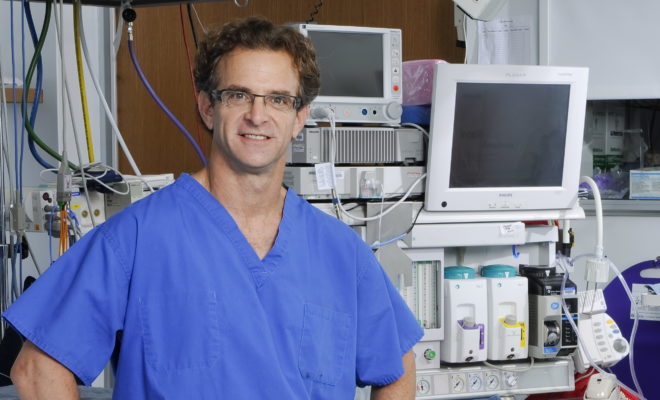
Health & Wellness
InHealth: Should I Have My Hernia Repaired?
By Jonathan Yunis, MD, FACS
What is a hernia?
A hernia is a defect or hole in the muscular abdominal wall that allows internal organs or fat to pass through it toward the overlying skin. When a hernia occurs, one may notice a protrusion or bulge under the skin of the abdomen. The swelling or bulge can be painless, uncomfortable, or very painful. Some hernias present without an obvious bulge, which ultimately will develop slowly over time. The most common hernias occur in the groin (inguinal and femoral hernia) and in the belly button (umbilical hernia). Many hernias occur in areas of previous surgical incisions (ventral incisional hernias) in the abdominal wall.
Why do you have a hernia?
Most hernias occur because of a genetic predisposition. Repetitive heavy lifting or other forms of exertion are likely to cause the hernia to present earlier in your life. Ventral hernias from an abdominal surgical incision will occur in 20% of all abdominal operations. The risk for ventral incisional hernia development is increased in smokers, diabetics, obesity, and surgical wound infections.
Why have your hernia repaired?
1. Pain – While most hernias are painless, if your hernia is causing intermittent discomfort or pain, then surgical repair is the solution to eradicate these symptoms.
2. Appearance – Hernias are often disfiguring and an experienced hernia specialist often offers an enhanced cosmetic outcome.
3. Size – The natural history of a hernia left untreated is unpredictable. While many hernias can remain unchanged over time, most hernias tend to get larger. Hernia enlargement over time can lead to a much bigger operation with a more difficult recovery. Smaller hernias are often amenable to outpatient surgery and with recovery that usually will not require prescription pain medicine.
4. Risk of Emergent Incarceration or Strangulation – Incarceration of a hernia is when the intestine is trapped in the hernia defect. This can result in obstruction of the intestine causing abdominal pain and vomiting. After a hernia incarcerates, it can strangulate the intestine contained within the hernia. This strangulation compromises the blood flow to the intestine and if surgery is not performed to relieve this, overwhelming sepsis and even death is a possibility.
Why not have your hernia repaired? The risks of your hernia repair should be significantly lower than your risk of leaving it untreated. While this seems obvious, historically one in four people who undergo hernia surgery are unhappy due to problems with chronic pain, infection, or recurrence. These complications are clearly avoidable.
What can you do to insure the best chance for a favorable result? Seek treatment by an experienced hernia specialist whose practice is solely dedicated to hernia repair.
How should my hernia be repaired? If you have a hernia, you have options. Surgical options include conventional open surgery, laparoscopic surgery, and robotic surgery. Most repairs utilize mesh in order to reduce the risk of hernia recurrence. Some repairs can be performed without the use of mesh. There are many different types of mesh and it is generally safe when implanted by an experienced surgeon.
All hernias and the people who develop them are unique. There is no standard approach to hernia repair. Careful analysis of each person’s lifestyle and needs along with the location and size of the hernia are necessary to formulate a proper solution. A hernia specialist will help you make the best decision.
Jonathan Yunis MD FACS
Center for Hernia Repair
1435 South Osprey Avenue Suite 201
Sarasota, FL 34239
941.953.5917



You must be logged in to post a comment Login